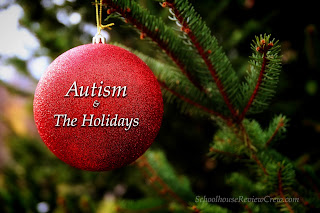
The holidays can be stressful enough on their own. Thanksgiving leads right into Christmas, then there’s New Year’s on top of that. Add autism to the mix, and the stress levels can skyrocket! Over the years, I’ve developed my own strategies for dealing with the stress of the holidays with autism.
The Magic of the Season: When my son was a toddler I was worried he would never “get” the magic of the season. I wanted him to believe in Santa and elves, and reindeer zipping through the night. We were blessed with services by our state’s early intervention team, so I requested that all therapy activities during this time frame be dedicated to the holidays in one way or another. While this did help my son to really get in on all of that magic stuff, I realize now it really didn’t matter. So many do not even do the whole Santa thing, that I feel silly for even making such a huge deal over it.
Gifts: Gifts are not the “reason for the season, ” but they are a pretty fun aspect. One thing that always bothered me was that my son never seemed interested in toys. My friends would all talk about the hottest new toy they were buying their kids for Christmas and I was over there thinking, “wow, my son wants a kitchen timer.” I realized I wanted him to want toys for my happiness, not his. Sure, it may seem a little strange to shop for your 6-year-old in kitchen wares instead of the toy aisle, but isn’t the gift about the person receiving the gift? Letting go of the toy expectations was huge for me.
Showing Appreciation: This goes along with gifts. Inevitably there will be that one gift someone lovingly gives to your child that your child will not like. We all try to teach our children to show appreciation no matter what, but for kids with autism-sometimes, this is a little hard to teach. My son has an overwhelming urge to inform others how much he does, or doesn’t, like whatever has been given to him. He may simply say, “Thank you 100%” for a gift he really likes or, “Thank you 50%” for one he doesn’t. Or he may flat out say, “I didn’t want this. You can have it back.” I used to stress over this so much that I would try to avoid it altogether! To combat this, I decided teaching him manners was more important than the surprise of the gift. Now, I just tell him what the gift is going to be. If he doesn’t like it, we practice what his reaction needs to be to show respect. Social stories 101!
Gatherings: Family gatherings can be stressful without having the added worry of over-stimulation. I host an annual Christmas party each year. I invite our friends and family over to our home so that we can spend time with them all at one time, rather than going to multiple parties or open house events. This cuts down on a lot of unnecessary stress. I also have my son gather up whatever items he doesn’t wish to share, and I put these away. Kids with autism can develop attachments to objects that others do not understand. My son knows how to share his toys, but I am not going to put him through added stress worrying over his special items. I also block off the upstairs so no one has access to go up there. If my son needs a quiet place to retreat, he can go upstairs to decompress in a quiet zone. I also keep the days leading up to that party quiet, and the days afterward low key. In addition to all of that, I have him help me get things ready for the party, bake cookies, etc. This way he is well aware of what is going to happen, who will be there, where his quiet zone will be and have the chance to ask any questions he may need to ask.
These are just a few tips and tricks I’ve discovered along the way that has eased some of my own personal stress. The most important advice I could give anyone is to take a deep breath and relax. If your kid believes in Santa or never does, that’s ok. If your child gets the same joy over a roll of paper towels for Christmas that your friend’s child feels over the latest and greatest gadget, that’s ok. If your child needs to spend some time alone during a family gathering, it’s ok! And if your child professes his displeasure over a gift given to him, then you have a great opportunity to bring awareness to the wonderful quirks of autism.
—oOo—
A Big thank you to Missica S. from Through the Open Window for sharing these tips with us.
